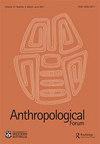The Dialectics of Adat: Colonialism, the State, and Indigeneity in Indonesia
IF 0.7
3区 社会学
Q3 ANTHROPOLOGY
引用次数: 0
Abstract
ABSTRACT In the wake of weakening leftist identities, indigeneity has become a promising political identity for economically marginalised people in rural areas worldwide. This is especially true for Indonesia with its anti-communist state ideology, but the roots of the Indonesian concept of indigeneity reach back at least into the late colonial era. The Dutch shaped the modern ideology of indigeneity in Indonesia through their conceptualisation of adat (custom), which is now deployed by indigenous activists to distinguish their indigeneity from other parts of society. Additionally, indigenous activists and communities in Indonesia have to distinguish themselves from other, also autochthonous parts of society due to the absence of settlers’ descendants. This contribution sheds light on how indigeneity is understood by indigenous activists in Indonesia. It draws on two cases, namely Dayakness as indigeneity in Kalimantan and the concept of masyarakat adat as the Indonesian translation of ‘indigenous peoples’ as it is used today by Indonesia’s largest indigenous organisation. Contrary to many contributions on indigeneity that stress relationality and post-structural approaches, this contribution suggests analysing indigeneity in a dialectical way and as a part of a social totality. This social totality, however, is not self-identical as it emerges through contradictions, for instance in the opposition of the state – indigenous peoples. Indigeneity thus appears to be an ideology that represents people’s relations to socio-economic conditions but also takes into account the relative autonomy of non-economic issues such as religion and culture.Adat的辩证法:印度尼西亚的殖民主义、国家和土著
随着左翼身份认同的弱化,土著身份已成为世界范围内农村经济边缘化人群的一种有希望的政治身份。对于奉行反共国家意识形态的印尼来说尤其如此,但印尼本土概念的根源至少可以追溯到殖民时代晚期。荷兰人通过他们对adat(风俗)的概念化,塑造了印度尼西亚土著的现代意识形态,现在被土著活动家用来将他们的土著与社会其他部分区分开来。此外,由于没有定居者的后代,印尼的土著活动家和社区必须将自己与其他土著社会部分区分开来。这篇文章揭示了印尼土著活动人士对土著的理解。它借鉴了两个案例,即加里曼丹作为土著的Dayakness和masyarakat adat的概念,masyarakat adat是印度尼西亚最大的土著组织今天使用的“土著人民”的印尼语翻译。与强调关系和后结构方法的许多关于土著的贡献相反,这一贡献建议以辩证的方式分析土著,并将其作为社会整体的一部分。然而,这种社会整体并不是自我同一性的,因为它是通过矛盾出现的,例如在国家-土著人民的反对中。因此,土著似乎是一种意识形态,它代表人们与社会经济条件的关系,但也考虑到宗教和文化等非经济问题的相对自主性。
本文章由计算机程序翻译,如有差异,请以英文原文为准。
求助全文
约1分钟内获得全文
求助全文
来源期刊

Anthropological Forum
ANTHROPOLOGY-
CiteScore
3.60
自引率
10.00%
发文量
14
期刊介绍:
Anthropological Forum is a journal of social anthropology and comparative sociology that was founded in 1963 and has a distinguished publication history. The journal provides a forum for both established and innovative approaches to anthropological research. A special section devoted to contributions on applied anthropology appears periodically. The editors are especially keen to publish new approaches based on ethnographic and theoretical work in the journal"s established areas of strength: Australian culture and society, Aboriginal Australia, Southeast Asia and the Pacific.
 求助内容:
求助内容: 应助结果提醒方式:
应助结果提醒方式:


